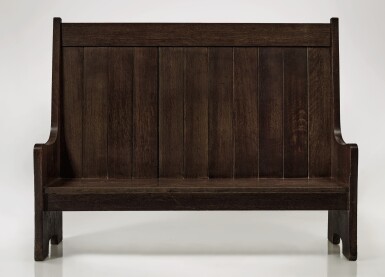Important Design
Important Design

Property from the Collection of Robert Kaplan, Maplewood, New Jersey
GUSTAV STICKLEY | AN IMPORTANT AND RARE SETTLE, MODEL NO. 196
Auction Closed
December 12, 09:10 PM GMT
Estimate
350,000 - 550,000 USD
Lot Details
Description
Property from the Collection of Robert Kaplan, Maplewood, New Jersey
GUSTAV STICKLEY
AN IMPORTANT AND RARE SETTLE, MODEL NO. 196
circa 1902
executed by the Craftsman Workshops of Gustav Stickley, Eastwood, New York
oak
55¾ x 71 x 25 in. (141.6 x 180.4 x 63.5 cm)
Collection of Elaine and Robert Dillof, Croton Falls, New York, acquired circa 1970s
Acquired from the above by the present owner
The Craftsman, August 1902, pp. iii-iv
Stephen Gray, The Early Work of Gustav Stickley, New York, 1987, p. 77
Tod M. Volpe and Beth Cathers, Treasures of the American Arts and Crafts Movement, 1890-1920, London, 1988, pp. 30-31
David Cathers and Alexander Vertikoff, Stickley Style: Arts and Crafts Homes in the Craftsman Tradition, New York, 1999, pp. 110-111
This rare Settle is an iconic example of Gustav Stickley’s "honest furniture," with its unadorned surfaces and skilled, visible construction elements. This style of furniture was partially a response against the cluttered Victorian-era interior and machine-made commodities, which resulted in a desire to emulate the medieval guild system of craft. The settle is a storied form, used extensively in the medieval era in all types of settings, from royal halls to farmhouses. The same Settle model was featured in the August 1902 issue of The Craftsman, where it was featured in a living room that was designed to be “convenient and beautiful.” The result of furnishings like this Settle’s “simplicity of effect” was meant to create a “soothing influence upon the brain.” This unique Settle draws inspiration from the integrity of medieval precedents in furniture production, yet ultimately achieves a uniquely modern aesthetic through its purity of essential form and geometric congruency. The present lot is one of only two known extant examples of the form.
